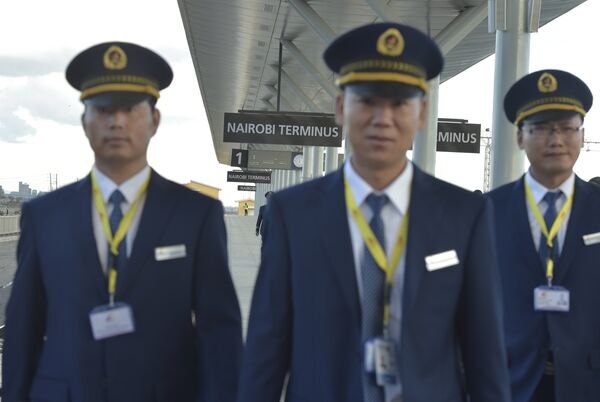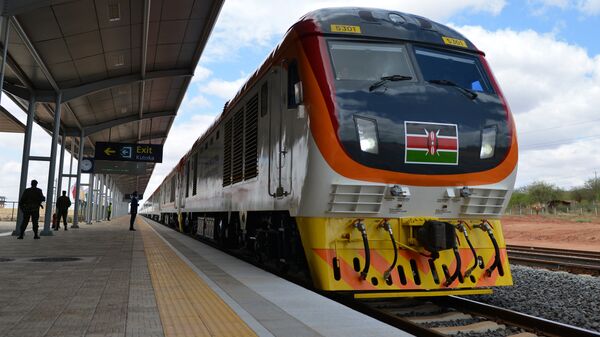Last week the Republic of Kenya, an East African state with coastline on the Indian Ocean, was celebrating 1,000 days since its standard gauge railway (SGR) linking Mombasa, Nairobi and Naivasha became operational. Nevertheless, the infrastructural project has faced tough criticism from the Western media, apparently due to the fact that it is being led by China which continues to gain ground in Africa.
"Debt Trap" or Step Towards Industrialisation?
The mainstream media argue that the $4.5-billion China-Kenyan endeavour is incapable of paying off and is nothing but Beijing's "debt trap". Thus, Deutsche Welle claims that the route is going to "nowhere" stopping "dead at a remote village"; Reuters writes that moving goods from Mombasa to Nairobi by rail is more expensive than by road; for its part, The Trumpet, an American monthly magazine, raises the alarm over China Exim Bank's alleged plans to lay hands on Mombasa's port.
Kenya's President Uhuru Kenyatta has repeatedly rejected the assumptions that the project is unprofitable, while Wu Peng, the Chinese ambassador to Kenya, highlighted in October 2019 that the railway – part of the Beijing-led “One Belt, One Road” initiative - had already bolstered the country's tourism, investments and communications.
Liu Yun, a researcher at Zhejiang Normal University, asserts that the "debt trapping" allegations are completely unfounded: "China's investment in African rail projects are not just about providing loans, but working together on the basis of mutual benefit and common gain", he stresses.
"In addition, railway construction is in line with the strategy of modern industrialisation in Africa", Liu underscores. "Whether in Kenya or other African countries, China's investment in railroad construction is carried out in accordance with the needs of African countries and in the interest of their national economic development".
The researcher points out that the employment rate along the railway is increasing since most of the staff with the exception of highly qualified workers are recruited locally.
"Currently, many African countries are looking for China's investments in their rail projects, and some countries that have not received them yet may even feel disadvantaged", Liu emphasises, adding that the China-led infrastructural endeavour are very popular in Africa.

Pompeo's Charm Offensive in Africa
Meanwhile, US Secretary of State Mike Pompeo issued a warning to African countries with regard to China's growing influence in the continent during his February tour to Senegal, Angola, and Ethiopia.
Given that all the three states have long been maintaining relations with Beijing, Pompeo warned them that they "run the risk that the prosperity and sovereignty and progress that Africa so needs and desperately wants won’t happen" if they continue to rely on "authoritarian regimes with empty promises".
Commenting on Pompeo's charm offensive against the three African states Liu Yun opines that the African strategy of Beijing is more in line with the continent's interests than that of the US.
He points out that the US contributes to the development of the African economy to a lesser extent than China: "Their government assistance to African countries is more concentrated in the areas of medical services and education, while investments in infrastructure are insignificant", he notes, adding that most of the Western projects are carried out by private enterprises and companies.
In contrast, "China's assistance or investments are mainly focused on infrastructure and production", he stresses.
"In addition, compared to Western countries, China’s technology transferred by Africa is more in tune with the current needs of African countries", Liu observes. "China's assistance aimed at [pushing forward] African industrialisation is more consistent with the present condition of African countries".
According to The New York Times, Pompeo, who embarked on his tour to Senegal, Angola and Ethiopia "almost two years since President Trump named him America’s top diplomat" sought to convince the African states to "shun Chinese investments" and turn to Washington and American companies for cooperation. However, Pompeo failed to offer any major new American government investment, initiatives or assistance, the media outlet highlighted.
Last year the Trump administration announced an initiative called "Prosper Africa" with the aim "to increase trade and investment" between the US and the continent. However, according to the US congressional research paper, the efforts of Washington in this field have to date brought modest results.
"In 2018, Africa accounted for 1.6% of US global trade and 0.8% of US foreign direct investment - about half the level recorded in 2010, the peak year for such measures over the past decade", the study says.
Meanwhile, China remains Africa's largest trade partner. According to US Census Bureau, the US' two-way trade in goods with Africa amounted to $56.8 billion in 2019, while China's two-way trade with the continent reached $208.7 billion the same year.





